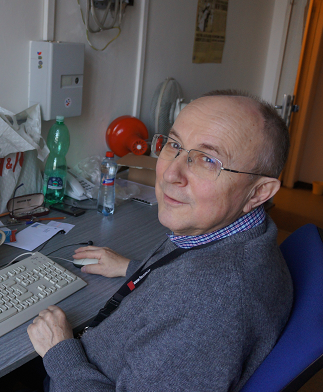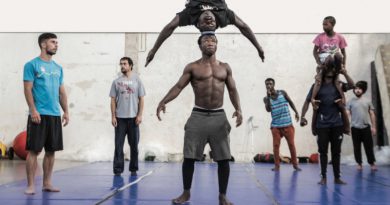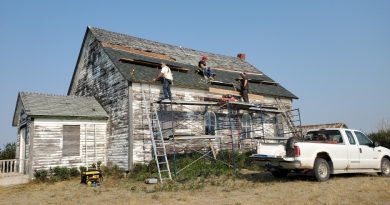Ivan Klindera: Shying away from the spotlight
Ivan Klindera first heard about the 1968 Soviet occupation of Czechoslovakia while travelling through France on holiday. Just before this significant historical development, he had been accepted for his philology studies at the Faculty of Arts in Prague. In the 1970s and 1980s, he was not allowed to work for the Czech Press Agency because of his father´s anti-communist stance. Therefore, he worked in several other enterprises where he could use the foreign language skills he had gained at the Faculty of Arts. After the Velvet Revolution, he was finally accepted at the Czech Press Agency, where he worked for the following 22 years.
In June 1968, Ivan Klindera had just successfully passed his entrance exams to study French and German at Charles University. He decided to spend some time travelling around France that summer. One August morning, on the train from Orléans to Paris, his friends abruptly woke him up. They took him to the train’s dining compartment and poured him a shot of liquer before telling him that the Soviet Union had invaded his country the night before. “They are only there to take part in some military exercises,” was Klindera´s first reaction.
Best opportunity
After graduating in 1973, Ivan Klindera sought employment where he could utilize his language skills. The Czech Press Agency (ČTK) seemed to offer the best opportunities. However, when he applied, general director Otakar Svěrčina uttered: “One Klindera was far too many.” Mr. Klindera´s father had once worked at ČTK, but his anti-communist ideology ultimately proved incompatible with the regime.
Rejected by the ČTK, Ivan Klindera applied for jobs with foreign trade companies. He was lucky enough to be hired by Koospol to work in the department that imported tropical and citrus fruits . He was in charge of invoicing and business correspondence, but was also allowed to sample the fruits that came in every day, at a time when these were unavailable for regular citizens living under communist rule in Czechoslovakia.
In 1990, Klindera was finally allowed to work for the Czech Press Agency. In January of that year, he started as an editor of the foreign desk, specializing in three German-speaking countries: Germany, Austria and Switzerland. According to Mr. Klindera, the authorities exerted a great deal of pressure, and imposed strict guidelines and restrictions on expressing one’s opinion: “Until 1991, all Czech media had been explicitly ordered what to write, how to write and what not to write. Everything was dictated by the ČTK, which had set rules and conditions. What is more, there were numerous telltales who used to inform on the Czech Press Agency employees, causing professional journalists to lose their jobs.” This was part of the typical ideological purges.
At the time of Czechoslovakia’s newly-acquired freedom, from 1992 to 1993, Mr Klindera was employed as ČTK’s foreign correspondent in Buchurest, Romania.
Shared memories
Between 1995 and 2000, he pursued his career as a correspondent at another foreign bureau, this time in Vienna. Klindera was living in Austria when a story spilled about the former mayor of Vienna, Helmut Zilk, r having been an STB Agent. Many journalists from the Czech Republic attempted to get Zilk´s reaction to the story, but it was Ivan Klindera whom Zilk agreed to speak to. Thanks to Klindera, the Czech Press Agency had an exclusive source for that story.
Mr. Klindera worked at the Czech Press Agency for 22 years. ,Then he chose a stress-free job, working at the Faculty of Social Sciences as a courier – making daily deliveries among its three buildings at Opletalova, Jinonice and Hollar. Every day for the past three years, he was in contact with many young people, including journalism students, most of whom had no idea how fascinating Mr Klindera’s professional life story had been.
He was extremely reliable, hard working and modest. Gifted people are often modest and do not boast about their experience, knowhow and insight.
We interviewed Mr Ivan Klindera the very week in which his contract at our faculty was coming to a close. We were lucky that he shared his memories and thoughts with us shortly before he finally retired to live in his weekend house outside Prague, and to enjoy spending more time in his beloved garden.
Thank you for your smiles, your encouragement, and above all, your story, Mr. Klindera.
- 1968 – 1973: Studied philology at the Faculty of Arts
- 1973 – 1977: Worked at Koospol – Department for import of tropical and citrus fruit
- 1977 – 1989: General Directorate at Water Buildings – Scientific-Technical Department
- 1990 – 2012: Editor of the foreign desk in Czech Press Agency
- 1992 – 1993: Correspondent in Bucharest
- 1995 – 2000: Correspondent in Viena
- 2013 – 2016: Courier at the Faculty of Social Sciences, Charles University
Text vznikl v rámci předmětu Angličtina pro žurnalisty pod vedením Mgr. Aleny Proškové.




